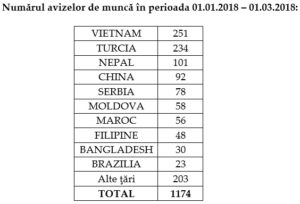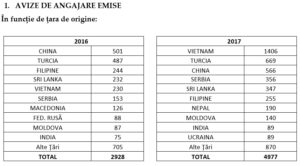:quality(80)/business-review.eu/wp-content/uploads/2016/03/employment.jpg)
Romania issued work permits during the first two months of this year for 1,174 foreign employees which came mainly from Vietnam, Turkey, Nepal, China and Serbia, according to General Inspectorate for Immigration data sent to Business Review. Morocco, Bangladesh and Brazil enter for the first time in the top 10 countries of origin in Romanian statistics regarding foreign workers. These figures show a record request for foreign employees in Romania, where businesses struggle with workforce shortages in sectors such as construction, HORECA or logistics.
Between January 1 and March 1, The General Inspectorate for Immigration, a branch of the Ministry of Internal Affairs, issued 1,174 new work permits for foreign employees from Vietnam (251 work permits), Turkey (234), Nepal (101), China (92), Serbia (78), Moldova (58), Morocco (56), Philippines (48), Bangladesh (30), Brazil (23) and other countries (202).

Official data show the total number of work permits for foreign employees issued by Romanian authorities and still in use was 7,249 on March 1, 2018, up from 6,709 in December 2017 and 5,594 at the end of 2016.
Statistics don’t include EU citizens, which don’t need a permit to work in Romania.
China and Turkey are by far the two leading countries of origin of migrant workers in Romania, with 1,473 work permits and 1,332, respectively, followed by Vietnam (1,012), Philippines (538), Sri Lanka (297), Serbia (263), Nepal (216), India (162), Ukraine (151) and Moldova (146). 1,659 migrant workers came from other countries, according to official data sent to Business Review.
But the real number of foreign workers in Romania is much higher, due to unreported work.
“We mention that during the year 2017, the police officers of the General Inspectorate for Immigration carried out 994 actions and controls on the fight against illegal work, at 1,559 companies, which resulted in the detection of 515 foreigners who were engaged in non-legal gainful activities,” General Inspectorate for Immigration said to Business Review.
Separate statistics of the General Inspectorate for Immigration show the number of employment permits issued during the last couple of years.
The number of employment permits issued by the General Inspectorate for Immigration surged 70 percent in 2017 against the prior year, to 4,977.

The main countries of origin for the foreign employees which obtained employment permits in 2017 are Vietnam (1,406), Turkey (669) and China (566).
Employers claim it’s harder than ever to find new workers in Romania in sectors like construction works or shipbuilding and prefer to bring foreign workers.
The impressive economic growth Romania experienced during the last few years put increasing pressure on employers to find skilled workers in order to expand their businesses, but recent official data show Romania is far from being considered in a ‘workforce crisis’ situation.
Eurostat, the European Union statistical office, showed on Friday that job vacancy rate in Romania fell 0.2 percentage points year on year in the last quarter of 2017, to 1.1 percent, the eighth lowest rate among the 28 EU member states.
Romania’s unemployment rate fell to 3.99 percent in January, the lowest in 25 years, more than a third of jobless persons having a low level of education, recent government data showed.
At the end of January, 348,963 persons were registred at local workforce occupancy agencies across Romania and 74,343 persons were receiving unemployment benefits.



:quality(80)/business-review.eu/wp-content/uploads/2023/09/Costin-Tudor_CEO-Undelucram.ro-parte-a-retelei-WhereWeWork.png)



:quality(80)/business-review.eu/wp-content/uploads/2024/06/22C0420_006.jpg)

:quality(80)/business-review.eu/wp-content/uploads/2024/06/COVER-1-4.jpg)



:quality(50)/business-review.eu/wp-content/uploads/2024/05/dreamstime_s_65382037.jpg)
:quality(50)/business-review.eu/wp-content/uploads/2024/04/Working-Romania.jpg)
:quality(50)/business-review.eu/wp-content/uploads/2024/03/Popescu_Andrada_web_Noerr.jpg)
:quality(80)/business-review.eu/wp-content/uploads/2024/06/br-june-2.jpg)
:quality(50)/business-review.eu/wp-content/uploads/2024/07/vodafone-RO.jpg)
:quality(50)/business-review.eu/wp-content/uploads/2024/07/BeFunky-collage-37-scaled.jpg)
:quality(50)/business-review.eu/wp-content/uploads/2024/07/04_ThinkPad_T14s_6_Business_Coworking.jpg)